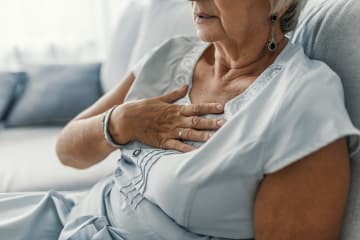
Overview
Heart palpitations are the uncomfortable sensation that your heart is beating fast or irregularly. You might feel pounding or fluttering in your chest. It might feel like your heart is skipping a beat.
Palpitations may be caused by a heart problem. But they also occur because of many other things. These include other health problems, stress, exercise, or use of alcohol, caffeine, or nicotine. Some prescription medicines and over-the-counter medicines can also cause heart palpitations. Nearly everyone has palpitations from time to time.
Depending on your symptoms, your doctor may need to do more tests to try to find the cause of your palpitations.
Follow-up care is a key part of your treatment and safety. Be sure to make and go to all appointments, and call your doctor if you are having problems. It's also a good idea to know your test results and keep a list of the medicines you take.
How can you care for yourself at home?
- If they trigger palpitations, limit or avoid alcohol or caffeine.
- Do not smoke. If you need help quitting, talk to your doctor about stop-smoking programs and medicines. These can increase your chances of quitting for good.
- Ask your doctor whether you can take over-the-counter medicines (such as decongestants). These may cause palpitations.
- If you think you may have a problem with drug use, talk to your doctor. Certain drugs, such as cocaine and methamphetamine, can affect your heart rate and rhythm.
- If you have palpitations again, take deep breaths and try to relax. Or try any physical things that your doctor recommended. These may include bearing down or coughing.
- If you start to feel lightheaded, sit or lie down to avoid injuries that might result if you pass out and fall down.
- If your doctor recommends it, keep a record of your palpitations and bring it to your next doctor's appointment. Write down:
- The date and time.
- Your pulse. (If your heart is beating fast, it may be hard to count your pulse.)
- If your heart rhythm was regular or irregular.
- What you were doing when the palpitations started.
- How long the palpitations lasted.
- Any other symptoms.
- What may have helped your symptoms go away.
- If an activity causes palpitations, slow down or stop. Talk to your doctor before you do that activity again.
- Take your medicines exactly as prescribed. Call your doctor if you think you are having a problem with your medicine.
When should you call for help?
Call 911 anytime you think you may need emergency care. For example, call if:
- You passed out (lost consciousness).
- You have symptoms of a heart attack. These may include:
- Chest pain or pressure, or a strange feeling in the chest.
- Sweating.
- Shortness of breath.
- Pain, pressure, or a strange feeling in the back, neck, jaw, or upper belly or in one or both shoulders or arms.
- Lightheadedness or sudden weakness.
- A fast or irregular heartbeat.
- You have symptoms of a stroke. These may include:
- Sudden numbness, tingling, weakness, or loss of movement in your face, arm, or leg, especially on only one side of your body.
- Sudden vision changes.
- Sudden trouble speaking.
- Sudden confusion or trouble understanding simple statements.
- Sudden problems with walking or balance.
- A sudden, severe headache that is different from past headaches.
Call your doctor now or seek immediate medical care if:
- You have heart palpitations and:
- Are dizzy or lightheaded, or you feel like you may faint.
- Have new or increased shortness of breath.
Watch closely for changes in your health, and be sure to contact your doctor if:
- You continue to have heart palpitations.
Where can you learn more?
Go to http://www.healthwise.net/patientEd
Enter R508 in the search box to learn more about "Palpitations: Care Instructions".
Current as of: July 31, 2024
Author: Ignite Healthwise, LLC Staff
Clinical Review Board
All Healthwise education is reviewed by a team that includes physicians, nurses, advanced practitioners, registered dieticians, and other healthcare professionals.

